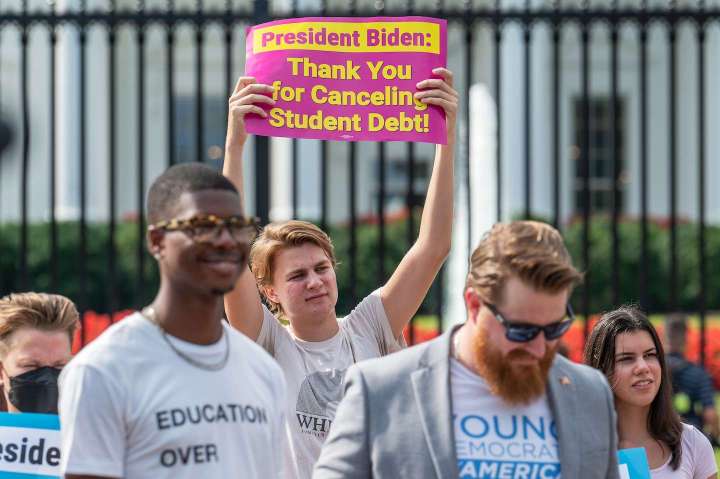The Pacific Legal Foundation, libertarian litigators with no shortage of things to litigate against, might have found the key to unlocking a courthouse door. If it has, President Biden’s slapdash, election-season, $500 billion (at least) student-loan forgiveness might perish from multiple flaws.
Biden’s slapdash, election-season student loan gambit may be in trouble

How else does student-loan forgiveness violate statutory and constitutional law, common sense, and justice? Let us count the ways.
It transfers wealth upward to a mostly affluent minority — college graduates, with higher projected lifetime earnings (on average, nearly $1 million higher) than the nearly two-thirds of Americans without college degrees who will pay, as taxpayers, to improve the financial condition of those who do. Forgiveness is unjust to students who worked and scrimped to avoid accumulating education debt. And to those who repaid their debts. Forgiveness creates moral hazard: Future students will borrow in anticipation of future forgiveness. Forgiveness draws arbitrary distinctions: Why is student debt a more pressing problem than, say, consumer or auto or mortgage debt? The half-trillion-dollar expenditure will dwarf the postulated $248 billion in savings from the new, whimsically titled Inflation Reduction Act.
Although the Supreme Court has admonished the executive branch that Congress does not “hide elephants in mouseholes,” Biden purports to have found an enormity — authorization for a gargantuan expenditure — somehow implied, if you squint hard enough, in the 2003 Heroes Act. It allows executive action modifying student loans during wartime (e.g., 2003) or other “national emergency.” Nowadays, emergencies exist when presidential caprice proclaims them. Under the 2003 act, student borrowers are heroes. Talk about defining virtue down.
Follow George F. Will‘s opinions
FollowThe forgiveness policy was produced without statutory warrant or regular public notice and comment procedures. As a Pacific Legal Foundation attorney says, Biden has created “a $500 billion program by press release.”
The program’s defects provide what the military calls a target-rich environment. But because of the Supreme Court’s rules about who has “standing” to sue — rules that should be liberalized — a mere citizen cannot sue even though Biden’s election-season forgiveness cornucopia injures the citizen’s financial well-being, and the structure and processes of the citizen’s government.
The PLF has, however, found (among its attorneys) a plaintiff who would suffer a concrete injury from Biden’s forgiveness. He lives in one of the at least six other states where forgiven loans may be taxed as income. He says he will be economically injured by cancellation of his particular loan payments.
If the PLF can establish standing for its case, it will argue, inter alia, the applicability of the “major questions” and “nondelegation” doctrines. The former holds that when the executive branch claims a power to order changes with vast economic or political consequences (e.g., the Centers for Disease Control claiming a power to impose a nationwide eviction moratorium), courts should be skeptical unless legislation clearly and explicitly authorizes the power. It is implausible that, two decades after the Heroes Act was passed to cushion lives disrupted by war deployments, it authorizes Biden’s unilateral expenditure of a sum almost three times larger than the U.S. Army’s 2022 budget.
The nondelegation doctrine holds that Congress may not delegate to the executive branch essentially legislative power. Such as the power to rewrite the Heroes Act to waive statutory requirements incompatible with Biden’s sweeping forgiveness.
The floundering Biden administration, desperate to shield its program from judicial scrutiny, is tweaking it. However, six states might pry open the courthouse door. Their suit, filed Thursday, says Biden’s policy injures loan service providers in their states. And the forgiveness is “not remotely tailored to address the effects of the pandemic on federal student loan borrowers” as the Heroes Act – intended, remember, to help military members – requires.
Presidents properly wield “emergency” powers not to solve long-standing problems, but only in sudden, unexpected, fast-moving crises, and only until Congress can exercise its lawmaking jurisdiction. Biden, however, announced his loan forgiveness as an act of executive discretion justified by a law written in response to the Iraq War, an emergency that is over — a law repurposed to inflate presidential power during the declared pandemic emergency.
But about a month after Biden announced the forgiveness, he said: “The pandemic is over.” Nevertheless, progressives praise all this. Their praise has temporarily interrupted their professions of alarm about endangered constitutional, rule-of-law and democratic norms.






